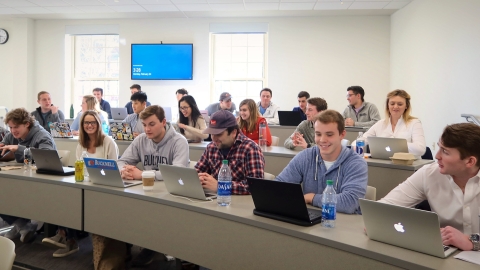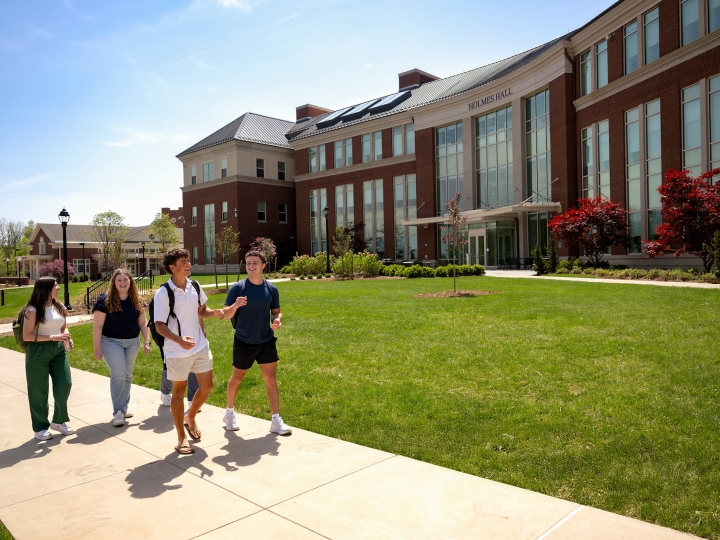
‘Not a Game’: Bucknell Management Students Steward a $2 Million Endowment Through Economic Turmoil
April 10, 2020
Students in Bucknell's Student Managed Investment Fund course hear a pitch on Feb. 24, 2020, just days before markets began their precipitous drop. The course has transitioned to remote education for the remainder of the spring semester. Photo by John Kador
Back in January, Tyler Wincig '20 felt bullish about Boeing.
The accounting & financial management major from New York City had spent weeks researching the company as part of the Freeman College of Management's Student Managed Investment Fund course, which entrusts a more than $2 million portion of Bucknell University's endowment to the stewardship of undergraduate students.
Wincig believed the company was poised to rebound from the grounding of its 737 Max airplane and "regain its title as the largest aircraft manufacturer in the world."
He convinced the class, which must approve investments by a two-thirds majority vote, to add 65 shares of Boeing stock to its portfolio.
COVID-19 wasn't on Wincig's radar.
"When I was pitching Boeing, the coronavirus was in China and nowhere else really," he says. "I thought it was going to be a repeat of past diseases that had spread, like SARS and Ebola. History repeats itself. It was going to be the same thing."
COVID-19 is, of course, having far more dire and far-reaching impacts than those previous epidemics. One of those effects: Wincig and his classmates are now navigating one of the worst financial downturns in U.S. history.
Since the global pandemic spread beyond China, that Boeing stock has plummeted to less than half the $315-per-share price the class bought it for, and while they're still ahead of where they started in August, overall the class' investments are down hundreds of thousands of dollars. For Wincig and his classmates, those losses hit home, because they're real.
"Our portfolio has lost $87,460 just today," Wincig says the afternoon of April 1. "That's our portfolio. That's money that we put to work on our own. It's not a game to any extent. And so it does hit home to see that happen and to know that we're the ones who have control over it."
In fact, that's the point. The value of a course like the Student Managed Investment Fund is that it's not a simulation, and extraordinary times, even and perhaps especially tough ones, offer Bucknell students authentic lessons that can't be taught any other way.
As global markets have moved from bull to bear and U.S. unemployment claims have skyrocketed, Bucknell management students are wrestling with challenges that traders 10 years older than them have seldom, if ever, encountered.
Lesson No. 1, for SMIF member Emily Robosson '20, is don't panic.
"When you see the market dropping, people's automatic inclination is to sell and get out while you can — the hardest thing to avoid is freaking out," says Robosson, an accounting & financial management major from Pittsburgh.
That's a natural feeling, Robosson says, especially for risk-averse investors and those approaching retirement age, for whom losses like these could be devastating. But for the students, who are shepherding an endowment that's intended to last forever, "it represents an amazing learning experience and a very good opportunity to invest for the future."
"Although the value of our portfolio has depreciated significantly in a short period of time, we now have the potential to make sound investments, which will help our portfolio rebound when the market does start to build back up," she says, noting that the SMIF portfolio still outperformed its benchmark by more than 3% from the start of the year to the end of March. "Relatively speaking, we're in a pretty good position, and now everyone's looking for growth opportunities and how we can position the portfolio to achieve the fastest rebound."
That rebound is now in the hands of the class. Throughout the year, students in the course deliver pitches recommending new investments to their classmates, who discuss and vote on their proposals. Their professors, Curtis Nicholls and Frank Schreiner, management, answer questions and may ask some of their own, but decisions about what to buy and sell are ultimately left to the students. Instead of delivering them in-person, students now record videos of their pitches and post them to a message board, but the process otherwise remains the same now that Bucknell has transitioned to remote education for the spring semester.
Prior to the drop, students recommended stocks including Delta Airlines and Booking Holdings, which owns travel services websites Booking.com, Kayak and Priceline. Today, they're gravitating toward food purveyors like Coca-Cola and tech companies including Adobe and Cisco, which makes networking equipment and internet conferencing systems. But the fundamentals students look for remains the same, says Neil Lin '20, an applied mathematical sciences major with an economics minor from Zhangjiagang, China.
Lin, who plans to work in proprietary trading after graduating, says he's unsure how the experience will affect him in the long run. He recalls one guest speaker his professors brought to class remarking that students who graduated during the 2008-09 recession tend to be more conservative, but for Lin, the biggest takeaway from the last few weeks has been how difficult it can be to time the market or predict its behavior. Instead of forecasting day-to-day market moves, he says he's focused on companies themselves, and the basic value they offer.
"What we can do is look at fundamentals, to see if the company really does something valuable — like creating good products, generating good profits, having a very stable cash flow and innovating," Lin says. "Those are the things we can research, and that's what's important in managing this portfolio for the longer term."
In that light, Wincig's Boeing buy may not turn out to be a bad investment. Wincig himself remains optimistic it will pay off in the end.
"It's a strong company that will hopefully be in the portfolio for the very long term," Wincig says. "If we invest in companies that we believe will remain staples of a growing U.S. economy, then we're doing our job in the long term."

